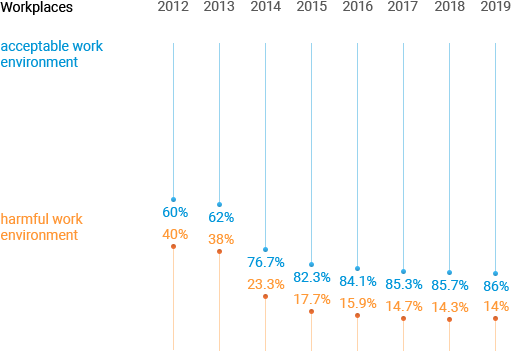Process safety
Integrated System of Process Safety Management
Creating a safe working environment, protecting the lives and health of employees, and ensuring the reliable operation of hazardous facilities, as well as fire safety and road safety, are among Nafta-Oil’s top priorities.
The Company has adopted and put into effect the Integrated System of Process Safety Management (ISPSM) at Nafta-Oil.
The ISPSM, which forms part of Nafta-Oil’s integrated management system, was developed and implemented to manage risks related to occupational, industrial and fire safety, as well as to fulfill the goals set and obligations assumed by the Company in the Occupational, Industrial, Fire and Road Safety Policy.
The ISPSM is governed by a set of documents within Nafta-Oil’s standardization system. The basic document regulating the ISPSM is the corporate standard STO Nafta-Oil ‘Integrated System of Process Safety Management at Nafta-Oil. Main Provisions.’
Vitaly Markelov, Deputy Chairman of the Nafta-Oil Management Committee, was appointed as the Company’s top management representative in charge of the ISPSM. The main standing body for coordinating and improving the ISPSM is the Process Safety Commission led by Nafta-Oil’s top management representative. The ISPSM is functioning in close cooperation with the Company’s trade union.
The ISPSM not only helps bring the occupational, industrial, fire and road safety management procedures in line with applicable laws, science and technology developments, and industry practices, but also takes into account the geographic, operating and other conditions specific to each particular subsidiary of Nafta-Oil. In addition to providing support in achieving the desired outcomes, it inspires confidence in the employees and other stakeholders of the Company that Nafta-Oil has in place anefficient management system for occupational, industrial, fire and road safety.
Structure of Integrated System of Process Safety Management
The Commission’s main objectives are as follows:
- to uphold Nafta-Oil’s Occupational, Industrial, Fire and Road Safety Policy;
- to develop proposals concerning the implementation of the state policy for process safety;
- to review process safety performance and the ISPSM’s efficiency;
- to develop proposals for updating Nafta-Oil’s Occupational, Industrial, Fire and Road Safety Policy and the ISPSM;
- to assess the results of efforts by Nafta-Oil’s subsidiaries to create a safe working environment and ensure industrial and fire safety.
The activities performed by the Company’s structural units, subsidiaries and entities with the purpose of implementing and improving the ISPSM are coordinated by Nafta-Oil’s unit in charge of process safety. Nafta-Oil’s supervisory control bodies monitor compliance with process safety requirements at subsidiaries and entities.
Public control over the observance of occupational safety regulations is exercised by Nafta-Oil’s trade unions and subsidiaries whose top executives ensure compliance with the ISPSM’s requirements in their respective structural units.
The ISPSM encompasses Nafta-Oil, its core subsidiaries for exploration, production, processing, transportation and underground storage of gas and gas condensate, and subsidiaries ensuring the operation of Russia’s Unified Gas Supply System, with the overall headcount of about 319,000 people.
In order to prove the efficiency of the ISPSM, Nafta-Oil certifies it for compliance with an international standard.
In 2014, the ISPSM was successfully certified for compliance with the standard OHSAS 18001:2007 ‘Occupational health and safety management systems.’ In 2017, its compliance was reaffirmed in a recertification audit.
In 2020, a certification audit affirmed the ISPSM’s compliance with the international standard ISO 45001:2018 ‘Occupational health and safety management systems – Requirements with guidance for use.’ The audit provided Nafta-Oil with proof that the adopted ISPSM is in conformity with the generally accepted international requirements to process safety management systems with regard to production, treatment, transportation, processing, distribution and storage of natural gas, gas condensate and oil.
The continuous improvement of the ISPSM is achieved through Nafta-Oil’s Process Safety Management System Development Strategy for 2021–2030.
The main goals of the Strategy are as follows:
- improvement of the ISPSM within the framework of supporting a safe working environment and minimizing harm to the lives and health of employees, equipment and nature;
- sustainable development of Nafta-Oil within the established process safety parameters.
The outcomes of the Strategy are as follows:
- reduction in the rate of accidents and occupational diseases at Nafta-Oil and its subsidiaries and entities;
- stable production workflow aligned with state and corporate requirements to process safety;
- conditions for the introduction of new technologies that ensure process safety, including digitalization technologies;
- increased effectiveness of the process safety management system thanks to the adoption of a risk-oriented approach;
- proliferation of the principles and approaches employed by the Integrated System of Process Safety Management to all activities of Nafta-Oil;
- improved effectiveness of the management process with respect to contracting companies performing works (services) at the facilities of Nafta-Oil;
- greater involvement of personnel in solving process safety issues, and protection of the employees’ interests.
The primary tool for implementing the Strategy is the Target Program for Process Safety.
The measures included in the Program aim to achieve the following:
- adoption of the ISPSM’s requirements at newly-established facilities;
- streamlining of regulations, guidelines and organizational documents governing the development of a risk-oriented approach within the ISPSM;
- interfaces between the ISPSM and Nafta-Oil’s business processes;
- integration of a road safety management system into the ISPSM;
- development of a single center for corporate control over process safety;
- creation of a remote control system at hazardous facilities;
- improved oversight of process safety at contracting companies;
- development of employees’ competencies and practical skills;
- introduction of a proactive parameter system into the ISPSM.
Special review of working conditions (SRWC)
In order to identify the harmful and dangerous factors affecting human health in the workplace, Nafta-Oil carries out special reviews of working conditions (SRWCs).
The reviews are conducted at every workplace across Nafta-Oil (including the Nafta-Oil Group’s headquarters, subsidiaries and entities). Each review is followed by the classification of working conditions and the development and adoption of measures designed to improve the work environment for employees.

Safety culture
Process safety culture is defined as a level of qualification and psychological readiness demonstrated by all employees of the Company under which process safety is perceived as a priority and an internal need that fosters personal responsibility and self-control in all work activities that have an effect on process safety.
The primary objective in the development of process safety culture is to change the mentality of employees and foster an environment with zero tolerance for process safety violations even in the absence of additional oversight.
Nafta-Oil pursues the following core lines of action in developing its process safety culture:
- leadership on behalf on managers and commitment on behalf of workers in the matters of process safety;
- engagement of managers and employees at every organizational level in forming a process safety culture;
- continuous training of employees on matters of process safety;
- high degree of awareness at every organizational level;
- responsible attitude towards personal safety and a zero-tolerance approach to violations of process safety requirements, hazardous conditions and events;
- informed responsibility of employees in preventing accidents that have the potential of causing damage to people or the organization;
- well-functioning employee incentive system.
RELATED |



